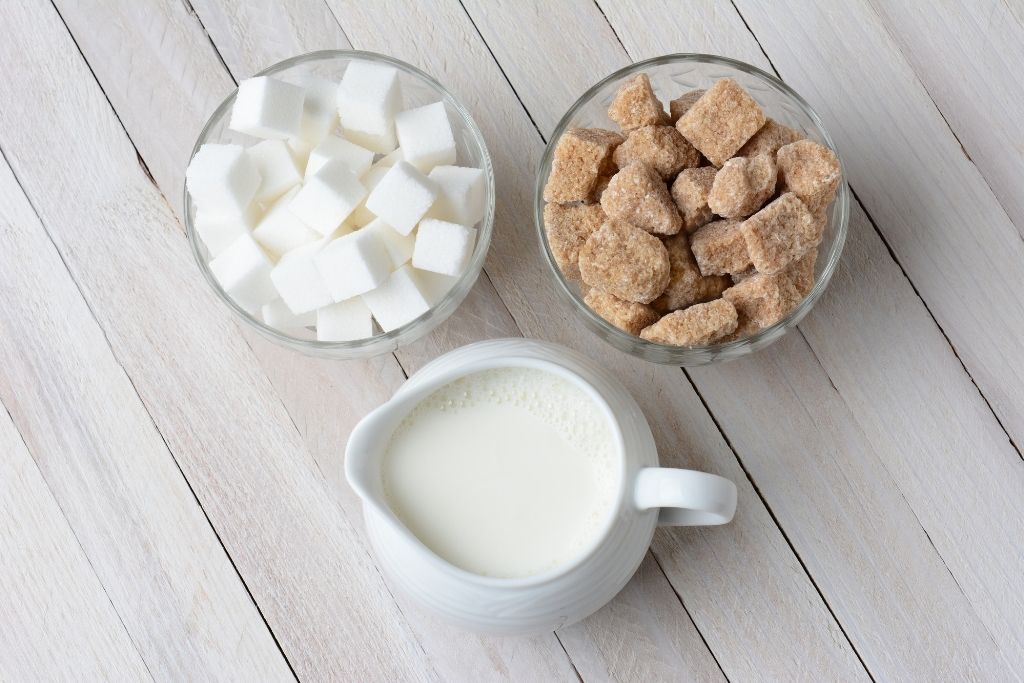- Australian children are eating too much added sugar.
- Ensure you’re supporting your fussy eater’s diet with products that are nutritious and don’t have added sugar.
- AptaGrow has no added sugar.
The importance of no added sugar for fussy eaters

Key points
.While every child is different, fussy eaters gravitate toward their preferred, familiar foods and as a busy parent, it can be hard enough just coordinating mealtimes, let alone finding foods that are both accepted by your child and healthy. Add to that that oftentimes your hard work can be thwarted by deceitful food labels with seemingly healthy snacks secretly packed with added sugar. Phew! That’s a lot.
There are solutions to ensuring your child is getting the nutrition they need and enjoying the foods they eat. First, there are a few key things to understand about healthy eating and the reality of our added sugar intake.
Sugar intake in Australian children
According to the World Health Organisation (WHO), the average adult should be consuming no more than 25g (6 teaspoons) of added sugar per day, and children should have little to none. For context, the average fizzy soft drink has 9 to 11 teaspoons of added sugar. With that, it quickly becomes clear how we can overdo it with added sugars in our diet.
Sugary treats and simple carbohydrates are easy to get and are sold in large quantities, and they taste good, so it’s easy to understand why we overconsume them. Plus, because simple carbohydrates (which is what sugar is) are broken down faster, they leave the body hungry sooner – meaning we eat more if we’re attempting to ‘fill up’ on these foods.
The trick is not to avoid these foods completely but to ensure you truly understand and limit the amount of them that your child is consuming, which is especially important for fussy eaters who are at a higher risk for not consuming a nutritionally complete diet.
The Australian Institute for Health and Welfare concludes 41% of daily food intake in children aged 14 to 18 and 29% in children aged 2 to 3 is ‘discretionary food’, meaning food that is not necessary to meet dietary requirements for a complete nutritional intake. Discretionary foods include foods with high levels of added sugar, saturated fats, and salt content. The consequences of too much sugar in your diet include obesity, diabetes, and cardiovascular disease.
What does it mean for you?
When you have a picky eater on your hands, you want to know the foods you are allowing them to eat are as nutritionally complete as possible. This goes not only for understanding which foods have added sugar, but also in knowing that if you are going to introduce supplemental nutrition, that you’re not making matters worse. There are a lot of supplemental drinks and foods out there, but they also aren’t all as ‘healthy’ as they might like you to think.
How to support your fussy eater’s diet
Rather than reach for a tried-and-true favourite, like a white bread sandwich (which contains added sugar), it’s important to consider other ways you can support your child’s healthy eating habits while supporting them to eat a fully nutritious diet.
Introducing a nutrient-dense supplement like AptaGrow, allows you to slowly support changes to your child’s eating habits, while they are getting the nutrition they need in the meantime.
AptaGrow contains 18 essential vitamins and minerals and provides one third of a child’s recommended dietary intake for key nutrients like iron, zinc and vitamin D in just one serve*. While some other milk supplements are flavoured with added sugar and artificial flavours to keep kids happy. AptaGrow we stick to the good stuff. AptaGrow still tastes great, like a glass of milk, and is packed with nutrients.
- Guideline: sugar intake for adults and children. World Health Organisation, 2015.
- Poor diet. Australian Institute of Health and Welfare, 2019.
*Based on the ANZ NHMRC nutrient reference values. Food for Special Medical Purposes. Must be used under medical supervision. Not suitable as a sole source of nutrition, designed to be consumed in conjunction with a healthy varied diet.
Related pages

Get in touch with our Careline experts
When your little one is unhappy or unwell you want reliable support from a trusted source. Our Careline team of nutritionists, dietitians and midwives specialise in infant and child health, offering free nutrition, feeding and product information.
Every feeding journey is unique
Not every parent can produce breast milk. No matter what choice you make, we will support your unique feeding journey.
We at Nutricia believe in providing the best nutrition for babies, which is why we recognise breast milk is uniquely superior for babies as it provides many benefits. It is important that mums have a healthy diet to support breastfeeding. A decision not to breastfeed, or partial bottle feed, may reduce breast milk supply making it difficult to reverse. The cost and social implications of using feeding methods should be considered. Always seek professional advice about feeding your baby. Ensure formula is used as directed as improper use can affect baby’s health.
REMEMBER: The information on this page is general only. If you have any concerns about your baby’s poo or questions about constipation or any other health concerns, please speak to a healthcare professional, like a Pharmacist, GP or Maternal Child Health Nurse.



